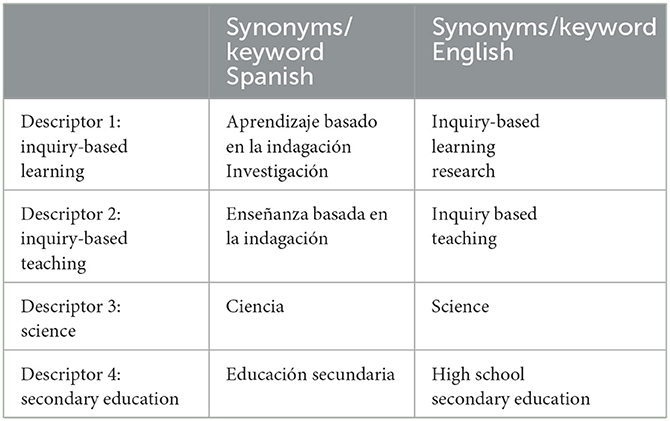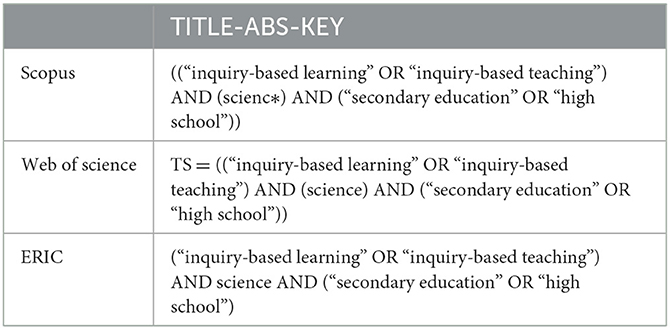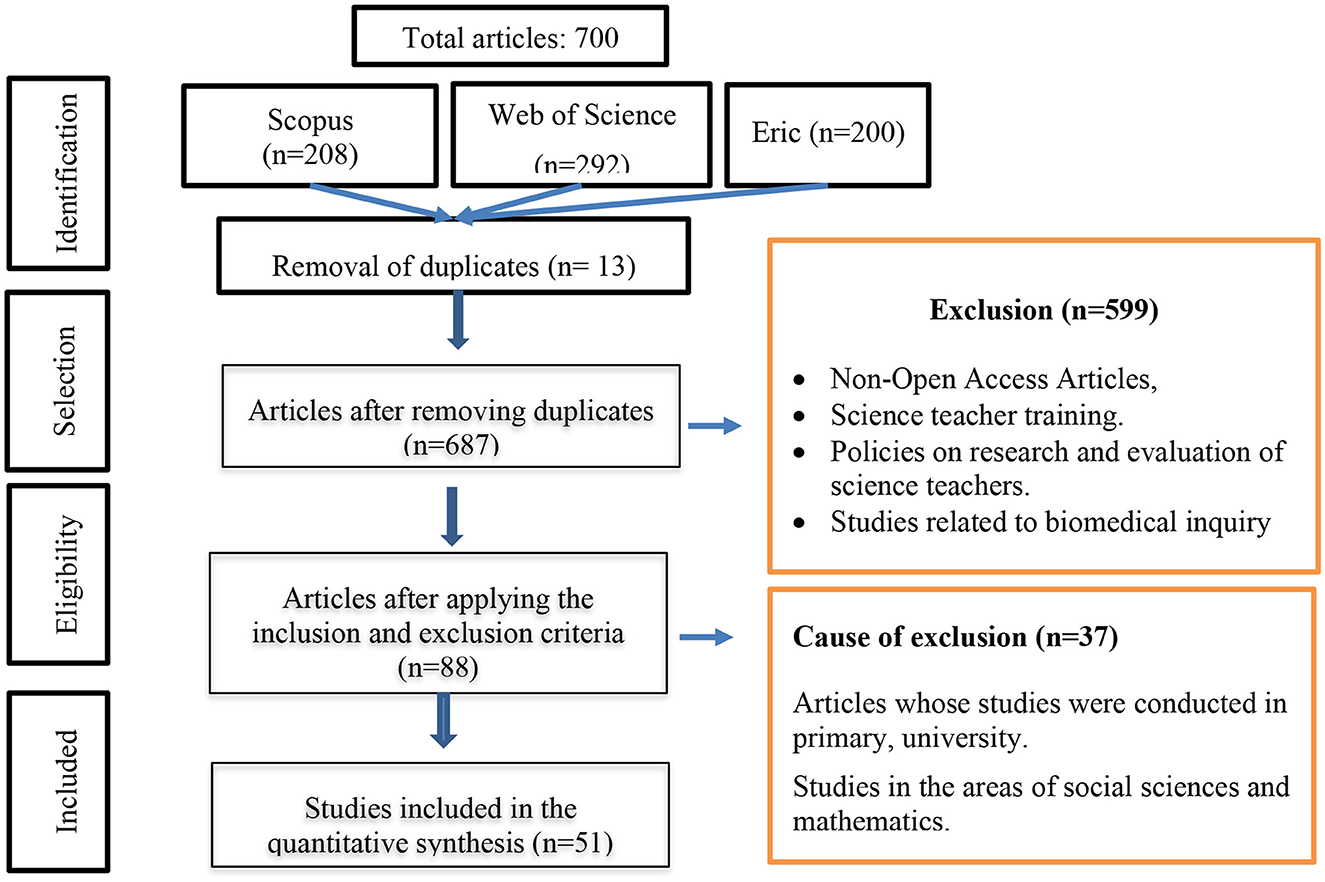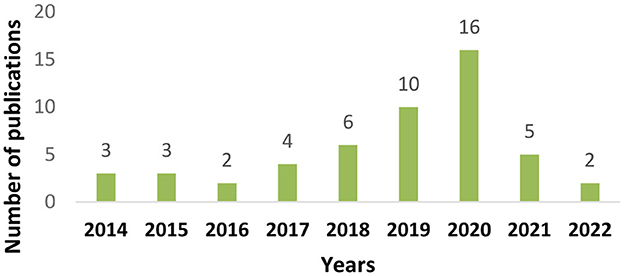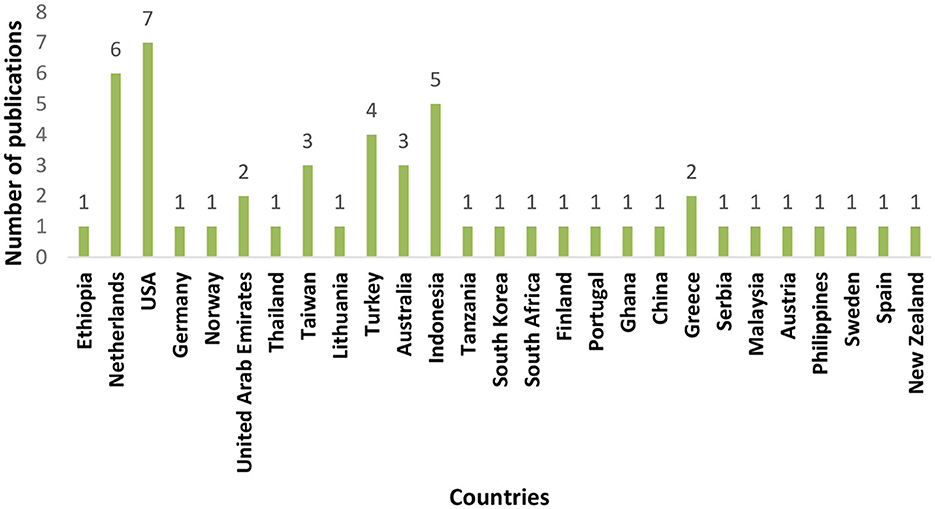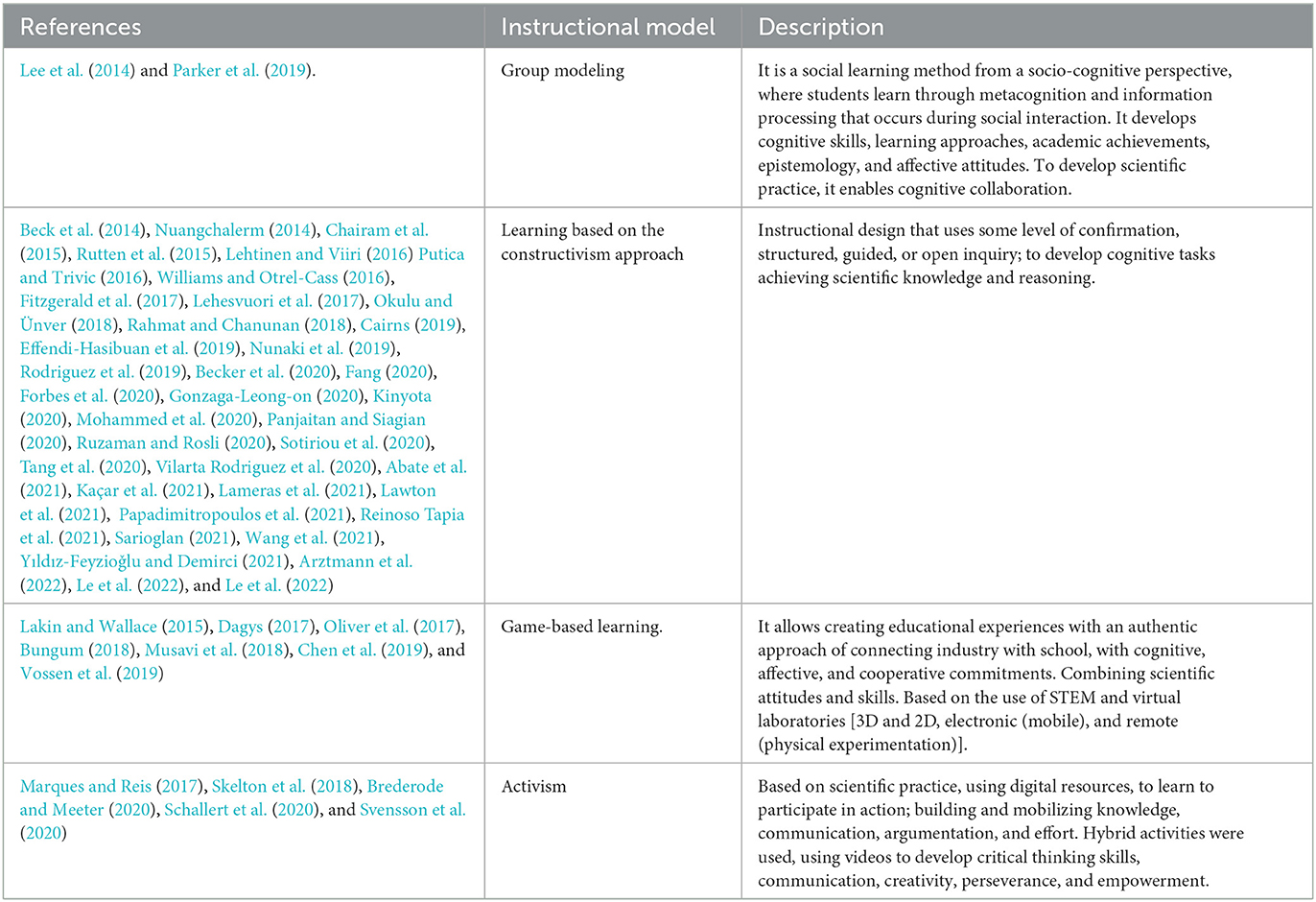- Facultad de Ciencias de la Educación, Universidad Nacional de San Agustín de Arequipa – Perú, Arequipa, Peru
The use of the inquiry-based instructional approach allows the development of research skills and construction of scientific knowledge. When coupled with effective teaching strategies, this approach allows for the modeling of the world's laws and theories with reality, thereby making science more accessible. The objective is to analyze the instructional models, subject areas, and developmental areas implemented by secondary school teachers in science education. After a systematic review of Web of Science, Scopus, and ERIC databases from 2013 to 2022, 51 articles were selected, which include qualitative, experimental, and descriptive works. The results indicate that teaching science has a tendency to achieve learning using scientific reasoning, with high expectations based on evidence, and a predisposition to the use of constructivism instructional models. The need for continuous teacher training to understand scientific knowledge and to master strategies for implementing open inquiry is emphasized. It is concluded that all studies focus on IBL, which encourages new ways of conducting science while considering the cyclic application processes. Similarly, the trend toward technology-based serious games, such as video, audio, and digital platforms, is becoming increasingly evident in current education, as is the drive to develop STEM methodologies.
1. Introduction
The Program for International Student Assessment (PISA) evaluates scientific competence carried out by the Organization for Economic Cooperation and Development (OECD) through assessments in the areas of reading, mathematics, and science competencies of adolescents aged 12 to 15 (Amini and Sinaga, 2021). In this perspective, educational institutions in countries have made efforts to improve the quality of education, especially in the scientific literacy of students, creating tools and strategies for students to assume positive attitudes toward science (Simamora et al., 2020). In this sense, scientific activities in the classroom should be dynamic, but teachers have not yet reached a consensus on what level of inquiry to use in teaching (Berie et al., 2022). In this regard, we aim to analyze the models, competencies of scientific inquiry, and didactic applications in studies that implement and allow for the dynamization of the knowledge and scientific reasoning used in classroom processes (Simamora et al., 2020). In this perspective, we need to expand our study to determine which instructional learning models in science are familiar to teachers, the thematic fields developed in classrooms, and the thematic development perspectives of practices, technology, and didactics in praxis.
Based on the results of PISA, in 2018 in the Peruvian context, only 404 points were achieved in relation to scientific competence, placing us at level 1a, demonstrating mastery of basic knowledge, simple explanations, identification of minimal causal relationships, which leads to low cognitive demand (Perú Aprendizajes et al., 2022). Based on these findings, it is necessary to analyze teachers' experiences in relation to science teaching, to find a balance point to improve classroom practices that lead to efficient and sustainable research and understanding of phenomena. Only one Peruvian student, representing 0.8%, reached level 6, demonstrating the management of scientific ideas with evidence of mastery of conceptual, procedural, and epistemic content for decision-making (Perú Aprendizajes et al., 2022). Just as they are transferring the information they learned in school to daily life (Kinyota, 2020; Tuna and Seckin-Kapucu, 2022). Given this need, it is necessary to analyze other contexts in the use of approaches, strategies, and forms of intervention in the science classroom, which allow for the reconceptualization of teachers' practices.
In the systematic review of literature, an analysis of the academic performance of scientific literacy of Indonesian students was found, between 2012 and 2015 with a low level and much lower between 2015 and 2018, meaning that they did not manage to achieve the skills: (a) Explain phenomena, (b) evaluate and design investigations, and (c) interpret data based on scientific evidence (Amini and Sinaga, 2021). Also, the analysis of the trend in the use of structured and confirmatory inquiries used by teachers to develop critical thinking and attitudes in the classroom (Berie et al., 2022). The importance of didactic strategies and the use of the school laboratory in the development of sciences were found, where the implementation of technology is highly beneficial carried out from a playful perspective, making a differentiation of use between electronic, virtual, and remote laboratories (Canchola-magdaleno and Suárez-medellín, 2022). Other studies include in their proposals the integration of digital technology through mobile phones to develop guided inquiry and open up a new scenario to the open one (Liu et al., 2021), as an alternative for autonomous thinking. It was also confirmed in the documentary review that the most used instruction by teachers and students was that of inquiry in sciences (Teig, 2021).
Within the gaps found, there is no evolution of inquiry-based learning with the capacity to generate scientific education in the classroom (Liu et al., 2021), which allows capturing the interactions of students together with teachers to analyze the actions, didactic sequences, and observable strategic behaviors in the inquiry process used (Teig, 2021). As well as approaching the analysis of scientific teaching in schools and its relationship with curricula (Kinyota, 2020).
This study is relevant because it opens up new scenarios for science teaching and the scientific, didactic, and technological impact that the world is assuming for achieving learning from its internal and external measurements; that make it possible to apply strategies that allow the internalization of curricular contents, in a real way to face and solve science-based problems.
1.1. Scientific literacy in the PISA framework
Scientific literacy is related to science in daily activities, to build a logical framework that enhances scientific thinking and knowledge (Alatli, 2020). This will be possible if the principles of: (1) Knowledge of the concepts and ideas of science; (2) understanding of the research process and the nature of how knowledge is obtained; and (3) awareness of the influence of scientific activities in the social context in which they are carried out and their effects are mobilized (Simamora et al., 2020).
Scientific knowledge, scientific thinking, and attitudes toward science together form scientific literacy (Miller, 1983). Therefore, the first one is centered on knowledge and understanding of scientific constructs to identify physical phenomena in the world; the second applies methods and principles of scientific inquiry, and the third verifies, respects logic, and considers assumptions and consequences (Lieskovský and Sunyík, 2022). For its assessment of scientific competence in PISA, it is framed in the following dimensions: context, competencies, attitudes, and knowledge. In the case of the first dimension, it is important to start from the local, regional or national context, which requires some scientific knowledge. The second dimension requires explaining, designing, and interpreting, the third creating awareness and scientific utility, and the fourth requires an understanding of content, process, and epistemic knowledge (Alatli, 2020). Its dynamicity depends directly on the model assumed by the teacher in basic education teaching.
1.2. Inquiry based instructional model of learning
The instructional model refers to the attitudes of students that they assume when solving a task with high cognitive participation (Lee et al., 2015), which allows them to explain, predict, experiment, and make decisions with opportunities to investigate their own questions about science-based topics and problems (Panjaitan and Siagian, 2020). The tendency in the analyzed literature is the use of the Inquiry-Based Learning (IBL) model, with a student-centered and constructivist instructional approach (Kaçar et al., 2021; Teig, 2021). This model allows for interpreting data, constructing models, or developing scientific explanations through a set of integrated activities that include experiments, integrating scientific knowledge and reasoning (Kaçar et al., 2021; Teig, 2021).
Studies based on IBL, based on TIMSS and PISA assessments, classify three lines of research: (1) inquiry as an instructional approach that examines different types of inquiry information, such as student or teacher characteristics, to explain perceived classroom implementation, (2) inquiry as an instructional outcome that focuses on explaining differences in student inquiry outcomes, either as overall science performance or specific scientific inquiry skills, and (3) inquiry as both an instructional approach and outcome that focuses on the relationships between inquiry input, process, and output (Teig, 2021, p. 12).
Therefore, IBL develops science through the following phases: (1) initiating the inquiry process; (2) improving dialogue with students; (3) forming discussion groups; (4) clarifying misconceptions students have about materials, scientific research procedures, and attitudes; and (5) using student experiences to form new knowledge (Odegaard et al., 2015). The inquiry activities involve planning, carrying out experimental steps, and proposing results (Sutiani et al., 2021). These stages open up the development of thematic fields in science education, generating scientific competence, scientific reasoning, communicative focus, scientific practices, attitudes, and skills (Martínez-Suárez, 2022).
Therefore, scientific competence relates to levels of abilities, knowledge, and attitudes; scientific practices allow for building school scientific models through modeling and argumentation, generating a positive and critical attitude toward science (Alcalá and Maqueda, 2022); scientific reasoning depends on three specific forms of knowledge: knowledge of concepts, procedures, and epistemic knowledge to justify scientific claims (Occelli and Valeiras, 2019).
The use of different constructivist-based learning methods, starting with a problem and emphasizing the process of creating information by students, using project-based learning, problem-based learning, cooperative learning, 5E and 7E models, among others (Bogar, 2019), is important to evidence their use in the classroom. Therefore, it is necessary to analyze the approaches, methods used by teachers, as well as the thematic fields of application developed to explain natural phenomena, scientific representations, didactics, and technologies that allow for communicating scientific concepts.
Given this openness of IBL in the educational field, it allows us to ask the following research questions:
RQ1: What are the instructional models of inquiry-based learning used in science teaching in secondary education?
RQ2: What are the thematic fields from the didactic and pedagogical perspective developed in the science classroom in secondary education that complement the IBL pedagogical approach in science used by teachers in secondary education?
RQ3: What are the educational contents modeled with constructivist methods in inquiry with practical, technological and didactic applications in secondary education?
2. Methods and resources
The study uses a systematic review research approach, utilizing the databases of Web of Science, Scopus, and ERIC for article search. The search for studies included in the analysis was conducted from July 4 to July 11, 2022, based on the defined protocol keywords. Articles were downloaded based on their title, abstract, and keywords from the databases and transferred to a matrix, where inclusion and exclusion criteria were applied. Once 51 documents were selected, the researchers conducted a reading phase to determine science models/methods, instructional design characteristics, educational content, technological and didactic applications based on science for high school students. Any disagreements were resolved through consensus.
The research process involved five stages: (1) establishing the criteria for selecting articles with a maximum publication date of 10 years, from 2013 to 2022, (2) determining the sources of information used in the study through online searches with Web of Science, Scopus, and ERIC, (3) selecting literature for review through keyword searches, (4) collecting data through EndNote X7 and Earlier and Publish or Perish, which were exported to Excel tables containing data on year, title, author name, and inquiry-based learning outcomes in secondary education, and (5) selecting data based on the article's information according to the experiences of inquiry-based learning in high school students. See Table 1 for a list of keywords and see Table 2 for validated search strings and see Figure 1 PRISMA method.
In this sense, the following criteria were delimited.
2.1. Inclusion criteria
Original scientific articles of open access published between 2013 and 2022, in English and Spanish, peer-reviewed, empirical, experimental, descriptive and qualitative articles, studies conducted in secondary education, inquiry-based learning, research developed in school environments where the participants were teachers or students, inquiry-based teaching, and science.
2.2. Exclusion criteria
Articles about students with learning difficulties, syndromes or disorders, studies on primary education, articles not published in education journals, doctoral theses.
3. Results
To determine the scientific significance of the sample, some bibliometric parameters or indicators were analyzed, such as year of publication and country, obtaining the following results.
Regarding the year of publication, the sample ranges from 2014 to 2022, with 2019 and 2020 being the years of highest production, with 10 and 16 articles, respectively. That is to say, it is in the last 4 years where the majority of the articles on this topic are concentrated, which allows us to infer a growing interest in it. Figure 2 shows the distribution of articles over time.
The distribution of these studies by country is shown in Figure 3. The variety of countries in which the research was carried out (33 countries) stands out in relation to the limited sample obtained, with the United States being the country with the highest number of publications found (7 articles), followed by the Netherlands (6 articles) and Indonesia (5 articles).
Based on the indicators proposed in the methodology, the results of the analyzed literature are presented:
RQ1: What are the thematic fields from the didactic and pedagogical perspective developed in the science classroom in secondary education that complement the IBL pedagogical approach in science used by teachers in secondary education?
The principles of constructivism are energized through hands-on learning, active and collaborative construction of knowledge, the relationship of learning with prior knowledge, and applicability in everyday life (Rutten et al., 2015; Dagys, 2017; Rahmat and Chanunan, 2018), which are reflected in the classroom through different teaching models that the teacher only guides or accompanies the student. Upon examining the studies, all of them used IBL centered on the constructivist model, with the use of different types of structured, guided, and open inquiry, with the latter two being a trend in science education. Group models are found to a lesser extent. Finally, there is a growing demand for the game-based learning model, where STEM and virtual, electronic, and remote laboratories are used in teaching, and experiential learning (Peters-Burton et al., 2015). It aims to generate scientific practices (Musavi et al., 2018; Natale et al., 2021) by addressing environmental problems with responsible, reflexive citizenship, becoming agents of change (Forbes et al., 2020). See Table 3 for more details.
RQ2: What are the thematic fields from the didactic and pedagogical perspective developed in the science classroom in secondary education that complement the IBL pedagogical approach in science used by teachers in secondary education?
From a pedagogical-didactic perspective, for the development of scientific thinking, the thematic field most addressed in studies refers to scientific reasoning, which opens up modeled educational practices that favor the affirmation and justification of what is learned. There is also a tendency toward scientific competencies that allow for modeling and understanding of processes to achieve knowledge and skills. Some studies prioritize scientific practices, attitudes, and skills that open up spaces for inquiry processes in science, where the student has a leading role. These pedagogical-didactic trends call for interest in the teaching and learning process not only from self-informed methods but also in the discursive aspect in classrooms (Martínez-Suárez, 2022, p. 17) (see Table 4).
RQ3: What are the educational contents modeled with constructivist methods in inquiry with practical, technological and didactic applications in secondary education?
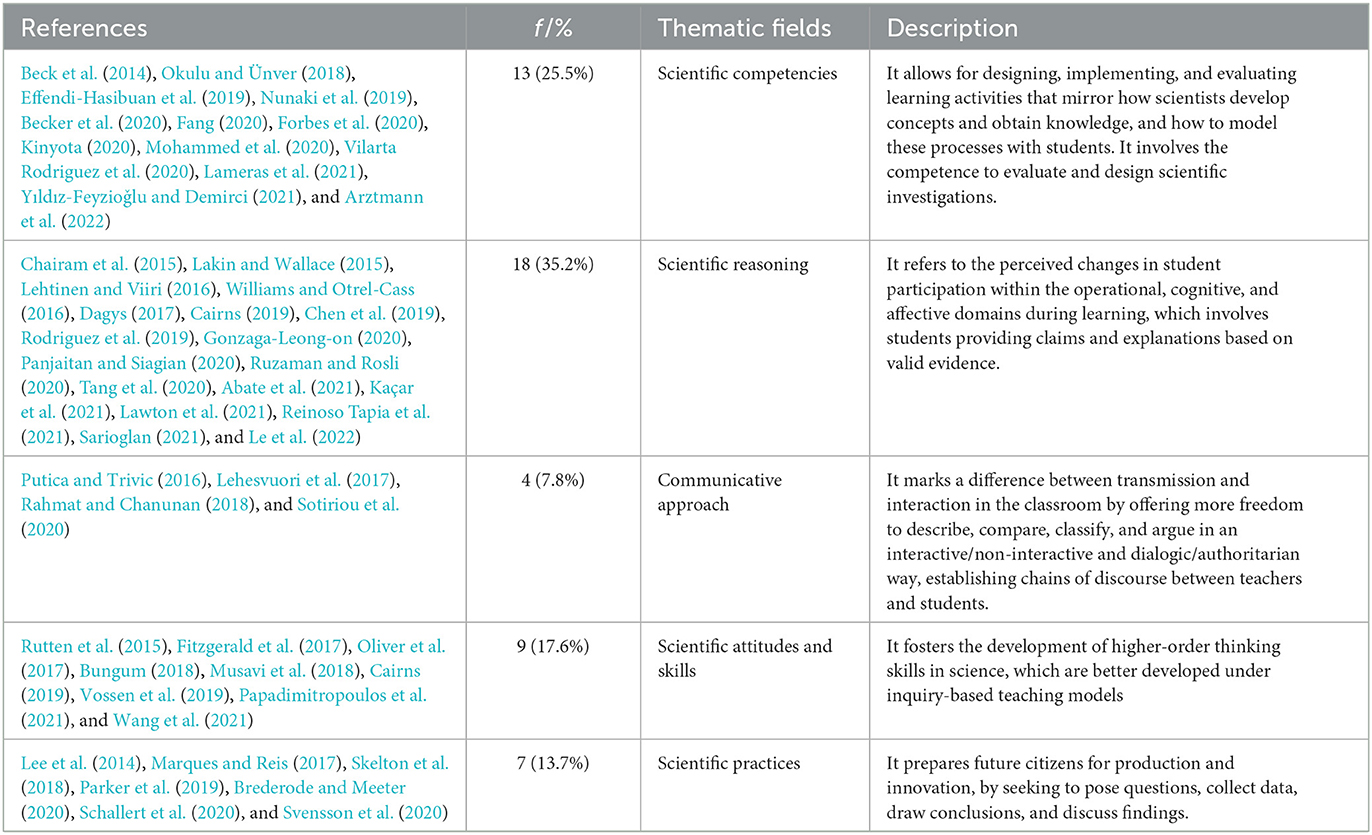
Table 4. Thematic fields in the science classroom in secondary education, from a pedagogical didactic perspective.
In the examined studies, the science area addresses various contents of the secondary school curriculum; but the greatest impact is grouped in the area of earth science and environment, which allows for the development of the thematic fields of competence and scientific reasoning, grouping 36 studies. Only 11 cover contents that address technological applications with authentic learning based on the use of laboratories, augmented reality, virtual reality, problem-solving, projects, experiments, and the use of platforms concentrated in the area of Science and Technology, which allow for reasoned reasoning, motivation, and cooperation in interactions. Finally, to a lesser extent, health science studies are located, which strengthen physical care and conservation of nature (see Table 5).
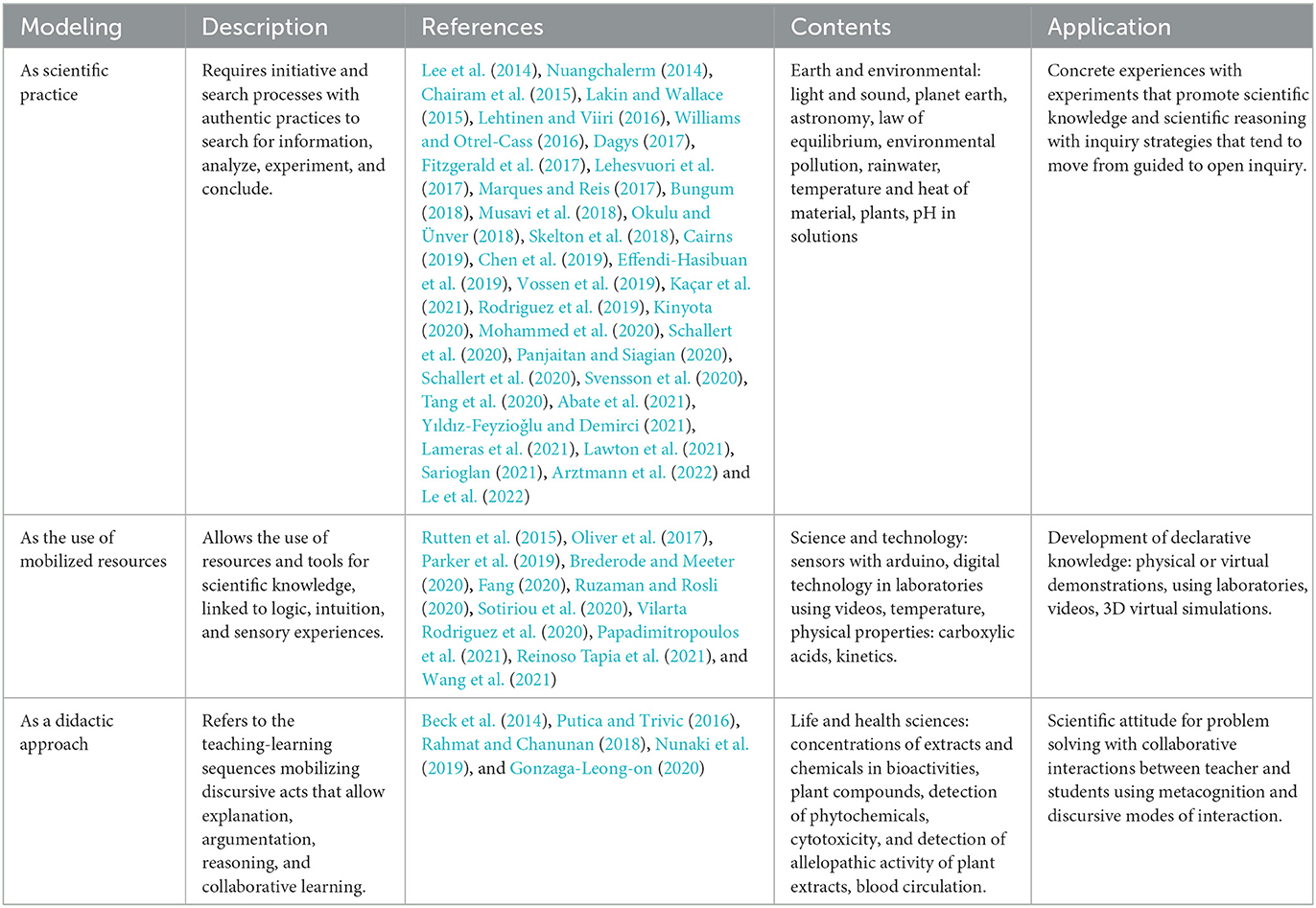
Table 5. Modeling of educational contents based on inquiry with didactic and technological application in secondary education.
4. Discussion
The pedagogical approach in IBL is present in all studies of science education in secondary education, supported more frequently by the constructivism approach, which allows for the design of learning and active participation situations, with the student as the protagonist, where knowledge is constructed and sustained over time, in contrast to reality. Consistent with this statement, studies have found a level of appropriation of IBL approach by teachers, allowing for the development of skills to learn and solve problems autonomously and cooperatively (Chairam et al., 2015; Dagys, 2017; Cairns, 2019; Kaçar et al., 2021), which allows for knowledge transfer (Chen et al., 2019). Similarly, activism and game-based learning are evolving as potential instructional models. STEM methodology presents an interdisciplinary approach in areas of engineering, mathematics, science, art, and technology, to implement problem-based pedagogical actions that enable a high motivational, communicative, argumentative, and reflective critical positioning experience, seeking to change attitudes and commitment to the environment (Musavi et al., 2018; Attard et al., 2021; Natale et al., 2021; Arztmann et al., 2022). Additionally, the use of laboratories allows for obtaining cognitive results, making learning more experiential in its execution. However, it is argued that there is a demand for appropriate and effective scaffolding techniques for inquiry processes (Kinyota, 2020).
From a pedagogical and didactic perspective in teaching, thematic fields show a trend toward scientific reasoning, which is similarly reflected in the analysis of understanding scientific processes and the development of higher-order cognitive skills (Cairns, 2019), with some efforts to achieve open inquiry that reflects the authenticity of science and encourages students to be active learners, resulting in effective implementation (Rahmat and Chanunan, 2018; Lameras et al., 2021). Likewise, it is detected that teachers are aware that the student is the protagonist of learning, under the guidance of the teacher. Consistent with this perspective, an analysis of the curriculum is required to establish how knowledge, skills, and attitudes are promoted in science and how teachers integrate technological devices in the classroom (Canchola-magdaleno and Suárez-medellín, 2022).
Regarding the content, it focuses on the area of earth science and the environment with an emphasis on scientific reasoning and competencies. Physics, biology, and chemistry are subjects that deal with the reactions and properties of substances, which require direct experiences, the use of laboratories, or virtual environments to understand the natural phenomena of the physical world, sustained with a focus on sciences. In this perspective, cognitive learning seeks to solve real problems within the framework of authentic learning to achieve the understanding of acquired knowledge (Chairam et al., 2015; Putica and Trivic, 2016). Therefore, teachers face challenges and dilemmas when implementing scientific inquiry teaching in their classrooms (Chen et al., 2019), but due to the lack of time and the handling of materials, methodologies, conceptual understanding of content, competencies, and motivation by teachers, this teaching can lead to routine and mechanical activities (Correia and Harrison, 2019; Fitzgerald et al., 2019).
The findings of this systematic review highlight, firstly, the learning activities used that address different themes with a tendency toward the dominance of scientific reasoning and competency, emphasizing modeling as a scientific practice that manifests didactic intentionality to understand and explain natural phenomena. Consistent with the findings, it is argued that the design of different didactic materials and instructional procedures promotes motivation, interest, and commitment by effectively involving students in practice (Chen et al., 2019; Kaçar et al., 2021). The second finding reports that it is timely to examine current models of professional development for science teachers, as the inquiry model requires time, preparation, and experience. In different studies, it has been found that teachers struggle to apply the instructional model or are unaware of the meaning of a deep understanding of the IBL model using any form or strategy (Lee et al., 2015; Dagys, 2017; Fitzgerald et al., 2019) due to a lack of disciplinary and didactic mastery (Alston et al., 2017). The third finding shows that scientific inquiry developed in most of the studies is structured and guided, with a tendency to migrate toward open inquiry. It focuses on promoting critical thinking, argumentation, and modeling for the development of scientific competency. Therefore, the use of game-based learning is recommended to enhance the use of laboratory (Chairam et al., 2015; Romero-Ariza, 2017; Becker et al., 2020).
The contribution of this work revolves around the argument that teachers' practices in implementing school science are effective in their development and that the results are optimal for improving student performance. These practices are based on the IBL instructional model, which, together with different methodologies of the constructivist approach, allows for the mobilization of learning to authentic scenarios to activate motivation and interest in the sciences, with high commitment, creativity, and critical thinking. In this perspective, digital and intelligent technologies allow enhancing science education in the school curriculum, enabling motivation, engagement and effective learning results from the analysis of the literature on the use of games in science education, their potential and their connection with learning, highlighting the growing integration of digital and intelligent technologies in education to improve learning (Kalogiannakis et al., 2021).
Finally, it is necessary to rethink teacher preparation for these new educational scenarios based on inquiry, with support for task preparation, appropriate methodology for the context, and the selection of content to bring them closer to reality (Dagys, 2017). To this end, it is argued that it is necessary to continue exploring the impact of teachers' professional development, along with students' learning outcomes (Chen et al., 2019).
Within the limitations, this study does not report an analysis of the types of inquiry, work, or inquiry strategies most commonly used, as this would be important to establish for future research. It would be important to conduct a qualitative cohort study that uses the methods that teachers in the classroom use to work on science, and to address the efforts and gaps that exist to face current challenges and trends in science teaching.
5. Conclusions
This study presents a qualitative summary of the results of 51 research studies on inquiry-based learning (IBL) in science education at the secondary level. In general, it can be concluded that the studies report that the IBL approach is worked from a constructivist perspective, and that teachers in their instructional interventions also show an increase toward approaches to learning based on games and activism. There is high heterogeneity in the models and interventions in science and technology education, which requires rigorous planning of the technological and physical tools to be used, and appropriate didactic intervention that denotes a high prevalence of scientific reasoning, as well as curricular interventions in earth science and environmental science content. Therefore, more empirical research is needed that reports on the observation of experiences in the classroom, the types of inquiry being developed, the modeling and scaffolding practices used by teachers in the classroom, as well as the approach and strategies they develop to teach science and detect strengths and weaknesses in their professional development. This is because the inquiry model requires time, preparation, and experience, and can open up ethnographic or narrative studies. The growing demand for education has driven the development of STEM methodologies and the use of games as educational tools. The trend toward technology-based serious games, such as video, audio, and digital platforms, is increasingly evident in current education.
Data availability statement
The original contributions presented in the study are included in the article/supplementary material, further inquiries can be directed to the corresponding author.
Author contributions
Study conception and design: FT-M, FR, KC, and DU. Data collection, analysis, and interpretation: DU and FR. Elaboration of the draft (first version): RM, FT-M, and FR. Critical revision of the article with important contributions to its intellectual content: FR, FT-M, RM, and DU. All authors contributed to the article and approved the submitted version.
Funding
This research was funded by Universidad Nacional de San Agustín de Arequipa, UNSA - INVESTIGA, Faculty of Education Sciences within the framework of the project Serious Games to Promote Scientific Inquiry in Secondary School Students, grant number PI-007-2023-UNSA.
Conflict of interest
The authors declare that the research was conducted in the absence of any commercial or financial relationships that could be construed as a potential conflict of interest.
Publisher's note
All claims expressed in this article are solely those of the authors and do not necessarily represent those of their affiliated organizations, or those of the publisher, the editors and the reviewers. Any product that may be evaluated in this article, or claim that may be made by its manufacturer, is not guaranteed or endorsed by the publisher.
References
Abate, T., Michael, K., and Angell, C. (2021). Upper primary students' views vis-á-vis scientific reasoning progress levels in physics. Eurasia J. Math. Sci. Technol. Educ. 17, em1958. doi: 10.29333/ejmste/10834
Alatli, B. K. (2020). Ögrencilerin Fen Okuryazarligi Performanslarinin Asamali Dogrusal Modelleme ile Incelenmesi: PISA 2015 Türkiye ve Singapur Karsilastirmasi. Egitim ve Bilim 45, 17–49. doi: 10.15390/EB.2020.8188
Alcalá, M. C. G., and Maqueda, E. M. (2022). Scientific practical initiation in Kindergarten: the digestive system through inquiry and modeling based learning. Revista Eureka 19. doi: 10.25267/REV_EUREKA_ENSEN_DIVULG_CIENC.2022.V19.I1.1202
Alston, D. M., Marshall, J. C., and Zambak, V. S. (2017). Inquiry instructional practice in middle school science classes: Applying Vroom's valence-instrumentality-expectancy theory of motivation. Sci. Educ. 26, 1–10. Available online at: https://eric.ed.gov/?id=EJ1272531
Amini, S., and Sinaga, P. (2021). Inventory of scientific literacy ability of junior high school students based on the evaluation of PISA framework competency criteria. J. Phys. Conf. Seri. 1806, 012017. doi: 10.1088/1742-6596/1806/1/012017
Arztmann, M., Hornstra, L., Jeuring, J., and Kester, L. (2022). Effects of games in STEM education: a meta-analysis on the moderating role of student background characteristics. Stud. SCi. Educ. 1–37. doi: 10.1080/03057267.2022.2057732
Attard, C., Berger, N., and Mackenzie, E. (2021). The positive influence of inquiry-based learning teacher professional learning and industry partnerships on student engagement with STEM. Front. Educ. 6, 693221. doi: 10.3389/feduc.2021.693221
Beck, C., Butler, A., and Burke da Silva, K. (2014). Promoting inquiry-based teaching in laboratory courses: Are we meeting the grade? CBE-Life Sci. Educ. 13, 444-452. doi: 10.1187/cbe.13-12-0245
Becker, S., Klein, P., Gößling, A., and Kuhn, J. (2020). Using mobile devices to enhance inquiry-based learning processes. Learn. Instruct. 69, 101350. doi: 10.1016/j.learninstruc.2020.101350
Berie, Z., Damtie, D., and Bogale, Y. N. (2022). Inquiry-based learning in science education: a content analysis of research papers in Ethiopia (2010-2021). Educ. Res. Int. 2022, 6329643. doi: 10.1155/2022/6329643
Bogar, Y. (2019). Literature review on inquiry-based learning in science education. Uluslararası Bilim ve Eğitim Dergisi. 1, 91–118. Available online at: https://dergipark.org.tr/en/pub/ubed/issue/43862/497258
Brederode, M. E. van, Zoon, S. A., and Meeter, M. (2020). Examining the effect of lab instructions on students' critical thinking during a chemical inquiry practical. Chem. Educ. Res. Pract. 21, 1173–1182. doi: 10.1039/D0RP00020E
Bungum, B. (2018). “Science inquiry as part of technological design: a case of school-based development in Norway,” in Professional Development for Inquiry-Based Science Teaching and Learning. p. 27–41. doi: 10.1007/978-3-319-91406-0_2
Cairns, D. (2019). 15.-Investigating the relationship between instructional practices and science achievement in an inquiry-based learning environment. Int. J. Sci. Educ. 41, 2113–2135. doi: 10.1080/09500693.2019.1660927
Canchola-magdaleno, S. L., and Suárez-medellín, J. (2022). Estrategias didácticas y tecnología utilizada en la enseñanza de las ciencias. Una revisión Sistemática 13, 1–18. doi: 10.33010/ie_rie_rediech.v13i0.1396
Chairam, S., Klahan, N., and Coll, R. K. (2015). 16.-Exploring secondary students' understanding of chemical kinetics through inquiry-based learning activities. Eurasia J. Math. Sci. Technol. Educ. 11, 937–956. doi: 10.12973/eurasia.2015.1365a
Chen, Y. -C., Pan, Y. -T., Hong, Z. -R., Weng, X. -F., and Lin, H. -S. (2019). Exploring the pedagogical features of integrating essential competencies of scientific inquiry in classroom teaching. Res. Sci. Technol. Educ. 38, 185–207. doi: 10.1080/02635143.2019.1601075
Correia, C. F., and Harrison, C. (2019). 2.-Teachers' beliefs about inquiry-based learning and its impact on formative assessment practice. Res. Sci. Technol. Educ. 38, 355–376. doi: 10.1080/02635143.2019.1634040
Dagys, D. (2017). 19.-Teorines tyrinejimais grindŽiamo mokymosi gamtamoksliniame ugdyme iŽvalgos: nuo ištaku iki 5E modelio. Pedagogika 126, 83–98. doi: 10.15823/p.2017.21
Effendi-Hasibuan, M. H., Harizon, N., and Mukminin, A. (2019). The Inquiry-based Teaching Instruction (IbTI) in indonesian secondary education: What makes science teachers successful enact the curriculum? J. Turkish Sci. Educ. 16, 18-33. Available online at: https://www.tused.org/index.php/tused/article/view/202
Fang, S. -C. (2020). Towards scientific inquiry in secondary earth science classrooms: Opportunities and realities. Int. J. Sci. Math. Educ. 19, 771–792. doi: 10.1007/s10763-020-10086-6
Fitzgerald, M., Danaia, L., and McKinnon, D. H. (2017). Barriers inhibiting inquiry-based science teaching and potential solutions: Perceptions of positively inclined early adopters. Res. Sci. Educ. 49, 543–566. doi: 10.1007/s11165-017-9623-5
Fitzgerald, M., Danaia, L., and McKinnon, D. H. (2019). 24.-Barriers inhibiting inquiry-based science teaching and potential solutions: perceptions of positively inclined early adopters. Res. Sci. Educ. 49, 543–566.
Forbes, C. T., Neumann, K., and Schiepe-Tiska, A. (2020). 25.-Patterns of inquiry-based science instruction and student science achievement in PISA 2015. Int. J. Sci. Educ. 42, 783–806. doi: 10.1080/09500693.2020.1730017
Gonzaga-Leong-on, M. S. (2020). Implementation and evaluation of 7es scientific inquiry through plant assay guide manual among grade 9 science, technology, and engineering (ste) junior high school students. Univ. J. Educ. Res. 8, 3496–3501. doi: 10.13189/ujer.2020.080824
Kaçar, T., Terzi, R., Arikan, I., and Kirikçi, A. C. (2021). 64.-The effect of inquiry-based learning on academic success: a meta-analysis study. Int. J. Educ. Literacy Stud. 9, 15. doi: 10.7575/aiac.ijels.v.9n.2p.15
Kalogiannakis, M., Papadakis, S., and Zourmpakis, A.-I. (2021). Gamification in science education. A systematic review of the literature. Educ. Sci. 11, 22. doi: 10.3390/educsci11010022
Kinyota, M. (2020). 27.-The status of and challenges facing secondary science teaching in Tanzania: a focus on inquiry-based science teaching and the nature of science. Int. J. Sci. Educ. 42, 2126–2144. doi: 10.1080/09500693.2020.1813348
Lakin, J. M., and Wallace, C. S. (2015). Assessing dimensions of inquiry practice by middle school science teachers engaged in a professional development program. J. Sci. Teach. Educ. 26, 139-162. doi: 10.1007/s10972-014-9412-1
Lameras, P., Arnab, S., de Freitas, S., Petridis, P., and Dunwell, I. (2021). 29.-Science teachers' experiences of inquiry-based learning through a serious game: a phenomenographic perspective. Smart Learn. Environ. 8, 4749. doi: 10.1186/s40561-021-00152-z
Lawton, E., Obenland, C., Barr, C., Cushing, M., and andNichol, C. (2021). Improving high school physics outcomes for young women. Phys. Rev. Phys. Educ. Res. 17, 010111. doi: 10.1103/physrevphyseducres.17.010111
Le, B., Lawrie, G. A., and Wang, J. T. H. (2022). Student self-perception on digital literacy in STEM blended learning environments. J. Sci. Educ. Technol. 31, 303-321. doi: 10.1007/s10956-022-09956-1
Lee, S., Kang, E., and Kim, H. -B. (2014). Exploring the impact of students' learning approach on collaborative group modeling of blood circulation. J. Sci. Educ. Technol. 24, 234–255. doi: 10.1007/s10956-014-9509-5
Lee, S., Kang, E., and Kim, H. B. (2015). 32.-Exploring the impact of students' learning approach on collaborative group modeling of blood circulation. J. Sci. Educ. Technol. 24, 234–255.
Lehesvuori, S., Ramnarain, U., and Viiri, J. (2017). Challenging transmission modes of teaching in science classrooms: Enhancing learner-centredness through dialogicity. Res. Sci. Educ. 48, 1049–1069. doi: 10.1007/s11165-016-9598-7
Lehtinen, A., and Viiri, J. (2016). Guidance provided by teacher and simulation for inquiry-based learning: a case study. J. Sci. Educ. Technol. 26, 193-206. doi: 10.1007/s10956-016-9672-y
Lieskovský, J., and Sunyík, V. (2022). How to enhance scientific literacy? Review of interventions focused on improving high school students' scientific reasoning skills and attitudes toward science. Ceskoslovenska Psychol. 66, 30–45. doi: 10.51561/cspsych.66.1.30
Liu, C., Zowghi, D., Kearney, M., and Bano, M. (2021). Inquiry-based mobile learning in secondary school science education: a systematic review. J. Comput. Assisted Learn. 37, 1–23. doi: 10.1111/jcal.12505
Marques, A. R., and Reis, P. (2017). Producción y difusión de vídeos digitales sobre contaminación ambiental. Estudio de caso: Activismo colectivo basado en la investigación. Revista Eureka Sobre Enseñanza Y Divulgación de Las Ciencias. 14, 215–226. Available online at: https://revistas.uca.es/index.php/eureka/article/view/3011
Martínez-Suárez, D. G. (2022). Pensamiento científico en la educación secundaria: acercamiento al estado de la cuestión. Trilogía Ciencia Tecnol. Soc. 14, e2150. doi: 10.22430/21457778.2150
Mohammed, S. M., Amponsah, K. D., Ampadu, E., and Kumassah, E. K. (2020). Extent of implementation of inquiry-based science teaching and learning in ghanaian junior high schools. Eurasia J. Math. Sci. Technol. Educ. 16, em1928. doi: 10.29333/ejmste/9373
Musavi, M., Friess, W. A., James, C., and Isherwood, J. C. (2018). 44.-Changing the face of STEM with stormwater research. Int. J. STEM Educ. 5, 2. doi: 10.1186/s40594-018-0099-2
Natale, C. C., Mello, P. S., Trivelato, S. L. F., Marzin-Janvier, P., and Manzoni-De-Almeida, D. (2021). 45.-Evidence of scientific literacy through hybrid and online biology inquiry-based learning activities. Higher Learn. Res. Commun. 11, 33–49. doi: 10.18870/hlrc.v11i0.1199
Nuangchalerm, P. (2014). Inquiry-based Learning in China: Lesson learned for School Science Practices. Asian Soc. Sci. 10, 64-71. doi: 10.5539/ass.v10n13p64
Nunaki, J. H., Damopolii, I., Kandowangko, N. Y., and Nusantari, E. (2019). The effectiveness of inquiry-based learning to train the students' metacognitive skills based on gender differences. Int. J. Instruct. 12, 505–516. Available online at: https://eric.ed.gov/?id=EJ1211049
Occelli, M., and Valeiras, B. N. (2019). “Modelizar, pensar y representar ciencias naturales con TIC,” in ri.conicet.gov.ar (Editorial Bellaterra Ltd). Available online at: https://ri.conicet.gov.ar/handle/11336/163873
Odegaard, M., Haug, B., Mork, S., and Sorvik, G. O. (2015). Budding science and literacy. A classroom video study of the challenges and support in an integrated inquiry and literacy teaching model. Proc. Soc. Behav. Sci. 167, 274–278. doi: 10.1016/j.sbspro.2014.12.674
Okulu, H. Z., and Ünver, A. O. (2018). The process of facilitating knowledge acquisition and retention: An inquiry into magnetic poles with challenging questions. Int. Educ. Stud. 11, 25–37. Available online at: https://eric.ed.gov/?id=EJ1177093
Oliver, M. C., Woods-McConney, A., Maor, D., and McConney, A. (2017). Female senior secondary physics students' engagement in science: a qualitative study of constructive influences. Int. J. STEM Educ. 4. doi: 10.1186/s40594-017-0060-9
Panjaitan, M. B., and Siagian, A. (2020). The effectiveness of inquiry based learning model to improve science process skills and scientific creativity of junior high school students. J. Educ. E-Learn. Res. 7, 380–386. Available online at: https://eric.ed.gov/?id=EJ1278400
Papadimitropoulos, N., Dalacosta, K., and Pavlatou, E. A. (2021). Teaching Chemistry with Arduino Experiments in a Mixed Virtual-Physical Learning Environment. J. Sci. Educ. Technol. 30, 550–566. doi: 10.1007/s10956-020-09899-5
Parker, C. E., Stylinski, C. D., Bonney, C. R., DeLisi, J., Wong, J., and Doty, C. (2019). Measuring quality technology integration in science classrooms. J. Sci. Educ. Technol. 28, 567–578. doi: 10.1007/s10956-019-09787-7
Perú Aprendizajes, M., Moreano Villena, G., Ramos Ascencio, S., Darcourt Márquez, A. L., La Riva, D., Marcos Balabarca, M., et al. (2022). El Perú en PISA 2018: Informe nacional de resultados. Repositorio.minedu.gob.pe. Available online at: https://repositorio.minedu.gob.pe/handle/20.500.12799/7725
Peters-Burton, E. E., Merz, S. A., Ramirez, E. M., and Saroughi, M. (2015). 13.-The effect of cognitive apprenticeship-based professional development on teacher self-efficacy of science teaching, motivation, knowledge calibration, and perceptions of inquiry-based teaching. J. Sci. Teacher Educ. 26, 525–548. doi: 10.1007/s10972-015-9436-1
Putica, K., and Trivic, D. D. (2016). 55.-Cognitive apprenticeship as a vehicle for enhancing the understanding and functionalization of organic chemistry knowledge. Chem. Educ. Res. Pract. 17, 172–196. doi: 10.1039/C5RP00179J
Rahmat, I., and Chanunan, S. (2018). 56.-Open inquiry in facilitating metacognitive skills on high school biology learning: an inquiry on low and high academic ability. Int. J. Instruct. 11, 593–606. doi: 10.12973/iji.2018.11437a
Reinoso Tapia, R., Collazos Martínez, M. Á., Martínez, M. del C., and Delgado Iglesias, J. (2021). Flipped classroom for teaching digestive system to high school students: Performance, perception and inquiry competence level. J. Technol. Sci. Educ. 11, 194–209. doi: 10.3926/jotse.1122
Rodriguez, S., Allen, K., Harron, J., and Qadri, S. A. (2019). Making and the 5E learning cycle. Sci. Teach. 086(05). doi: 10.2505/4/tst18_086_05_48
Romero-Ariza, M. (2017). Inquiry-based learning: is there enough evidence of its benefits in science education? Rev. Eureka 14, 286–299. doi: 10.25267/Rev_Eureka_ensen_divulg_cienc.2017.v14.i2.01
Rutten, N., van der Veen, J. T., and van Joolingen, W. R. (2015). 62.-Inquiry-based whole-class teaching with computer simulations in physics. Int. J. Sci. Educ. 37, 1225–1245. doi: 10.1080/09500693.2015.1029033
Ruzaman, N. K., and Rosli, D. I. (2020). Inquiry-based education: Innovation in participatory inquiry paradigm. Int. J. Emerg. Technol. Learn. 15, 4. doi: 10.3991/ijet.v15i10.11460
Sarioglan, A. B. (2021). Development of inquiry-based learning environment scale: A validity and reliability study. Malaysian Online J. Educ. Sci. 9, 27–40. Available online at: https://eric.ed.gov/?id=EJ1315800
Schallert, S., Lavicza, Z., and Vandervieren, E. (2020). Merging flipped classroom approaches with the 5E inquiry model: a design heuristic. Int. J. Math. Educ. Sci. Technol. 1–18. doi: 10.1080/0020739x.2020.1831092
Simamora, A. B., Widodo, W., and Sanjaya, G. M. (2020). Innovative learning model: improving the students' scientific literacy of junior high school. Int. J. Recent Educ. Res. 1, 271–285. doi: 10.46245/ijorer.v1i3.55
Skelton, P., Blackburn, J. J., Stair, K. S., Levy, N., and Dormody, T. J. (2018). Agriscience education through inquiry-based learning: Investigating factors that influence the science competence of middle school students. J. Agri. Educ. 59, 223–237. Available online at: https://eric.ed.gov/?id=EJ1176307
Sotiriou, S. A., Lazoudis, A., and Bogner, F. X. (2020). Inquiry-based learning and E-learning: how to serve high and low achievers. Smart Learn. Environ. 7, 29. doi: 10.1186/s40561-020-00130-x
Sutiani, A., Situmorang, M., and Silalahi, A. (2021). Implementation of an inquiry learning model with science literacy to improve student critical thinking skills. Int. J. Instruct. 14, 117–138. doi: 10.29333/iji.2021.1428a
Svensson, K., Eriksson, U., and Pendrill, A. -M. (2020). Programming and its affordances for physics education: A social semiotic and variation theory approach to learning physics. Phys. Rev. Phys. Educ. Res. 16, 010127. doi: 10.1103/physrevphyseducres.16.010127
Tang, H., Qiu, C., Meng, L., Li, Y., and Zhang, J. (2020). Factors predicting inquiry-based teaching in science across one belt one road countries and regions: A multilevel analysis. SAGE Open. 10, 215824402093251. doi: 10.1177/2158244020932511
Teig, N. (2021). “Inquiry in science education,” in International Handbook of Comparative Large-Scale Studies in Education. Springer International Handbooks of Education, eds T. Nilsen, A. Stancel-Pia̧tak, and J. E. Gustafsson (Cham: Springer). doi: 10.1007/978-3-030-38298-8_62-1
Tuna, S., and Seckin-Kapucu, M. (2022). Analysis of high school entrance exam (LGS) questions in terms of PISA scientific literacy. J. Steam Educ. 5, 31–54. Available online at: https://dergipark.org.tr/en/pub/steam/issue/68172/1018358
Vilarta Rodriguez, L., van der Veen, J. T., Anjewierden, A., van den Berg, E., and de Jong, T. (2020). Designing inquiry-based learning environments for quantum physics education in secondary schools. Phys. Educ. 55, 065026. doi: 10.1088/1361-6552/abb346
Vossen, T. E., Tigelaar, E. H., Henze, I., De Vries, M. J., and Van Driel, J. H. (2019). Student and teacher perceptions of the functions of research in the context of a design-oriented STEM module. Int. J. Technol. Design Educ. 30, 657–686. doi: 10.1007/s10798-019-09523-7
Wang, H. -S., Chen, S., and Yen, M. -H. (2021). Effects of metacognitive scaffolding on students' performance and confidence judgments in simulation-based inquiry. Phys. Rev. Phys. Educ. Res. 17, 020108. doi: 10.1103/physrevphyseducres.17.020108
Williams, P. J., and Otrel-Cass, K. (2016). Teacher and student reflections on ICT-rich science inquiry. Res. Sci. Technol. Educ. 35, 88–107. doi: 10.1080/02635143.2016.1248928
Yıldız-Feyzioǧlu, E., and Demirci, N. (2021). The effects of inquiry-based learning on students' learner autonomy and conceptions of learning: Research Article. J. Turkish Sci. Educ. 18, 401–420. Available online at: https://www.tused.org/index.php/tused/article/view/1083
Keywords: inquiry-based learning, science, inquiry-based teaching, secondary education, systematic review
Citation: Urdanivia Alarcon DA, Talavera-Mendoza F, Rucano Paucar FH, Cayani Caceres KS and Machaca Viza R (2023) Science and inquiry-based teaching and learning: a systematic review. Front. Educ. 8:1170487. doi: 10.3389/feduc.2023.1170487
Received: 23 February 2023; Accepted: 13 April 2023;
Published: 05 May 2023.
Edited by:
Stamatios Papadakis, University of Crete, GreeceReviewed by:
Effransia E. Tzagkaraki, University of Crete, GreeceSulistyo Saputro, Sebelas Maret University, Indonesia
Alkinoos Ioannis Zourmpakis, University of Crete, Greece
Copyright © 2023 Urdanivia Alarcon, Talavera-Mendoza, Rucano Paucar, Cayani Caceres and Machaca Viza. This is an open-access article distributed under the terms of the Creative Commons Attribution License (CC BY). The use, distribution or reproduction in other forums is permitted, provided the original author(s) and the copyright owner(s) are credited and that the original publication in this journal is cited, in accordance with accepted academic practice. No use, distribution or reproduction is permitted which does not comply with these terms.
*Correspondence: Diego Antonio Urdanivia Alarcon, ZHVyZGFuaXZpYUB1bnNhLmVkdS5wZQ==
 Diego Antonio Urdanivia Alarcon
Diego Antonio Urdanivia Alarcon Fabiola Talavera-Mendoza
Fabiola Talavera-Mendoza Fabian Hugo Rucano Paucar
Fabian Hugo Rucano Paucar